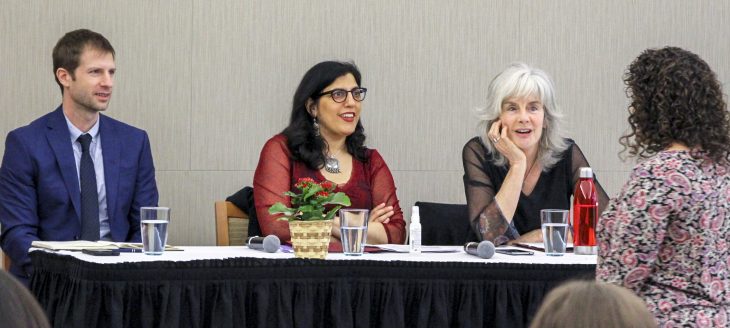Elon’s Multifaith Scholars program provides study, research and mentorship to create engaged citizens who will help navigate religious difference in cultures and society

A discussion about religious studies on Wednesday, March 11, examined past movements in the field and looked to the future of multifaith teaching and scholarship.
Amy Allocco, associate professor of religious studies and director of the Multifaith Scholars program, organized and moderated “What Does Multifaith Mean? Scholarship, Teaching and Mentoring in Interreligious Contexts.” Corinne Dempsey, director of International and Global Studies and professor of religious studies at Nazareth College in Rochester, New York; Hans Gustafson, director of the Jay Phillips Center for Interfaith Learning and adjunct professor of theology at the University of St. Thomas in St. Paul, Minnesota; and Shana Sippy, assistant professor of religion at Centre College in Danville, Kentucky, brought their experiences to Elon’s Numen Lumen Pavilion and a crowd of around 50 students, faculty and community members.
The panel marked the conclusion of the Multifaith Scholars program’s first three academic years. These initial years were funded by a grant from the Arthur Vining Davis Foundations to promote global engagement, undergraduate research and intensive mentoring to better serve a world grappling with religious conflict. The Multifaith Scholars program will continue with university funding.
Conversation surrounded the value of interreligious studies to society, and confronted the western and Judeo-Christian views that founded and continue to influence the academic field.
Sippy pointed to the temptation to focus on interreligious engagement that promotes only peaceful coexistence — such as shared shrines in Israel and Palestine and South Asia.
“The desire to elevate these engagements has been in large part a political process,” Sippy said. “In moments when we’re seeing such intense, horrible violence (in India and Palestine) we have to be mindful of highlighting places of conflict. We need to understand where people don’t meet and why they don’t meet.”
She went on to describe an interreligious project involving a religiously diverse and hostile high school campus. High school students’ expressions of their religious beliefs became part of an exhibition that “emerged out of tremendous pain and conflict” and provided understanding.
Those types of engagement with religious communities are the most valuable part of undergraduate interreligious scholarship, all three professors said.
“I have to remind myself to keep it simple” when teaching, Gustafson said. “Site visits, community engagement, a guest speaker: These are what students report as most transformative. Those points of contact are the most powerful.”

Looking to future trends in the academic study of religions and interactions between them, Dempsey said she was interested to watch how growing populations of non-religious and “religiously fluid” people who see fewer boundaries between religions would impact the world.
“We need to pay attention,” Dempsey said. “Will religion be broadened so that more people can fit in it?”
As interreligious studies broaden and shift, reflecting on the field’s foundations and biases will become more important. Particular attention was paid to decolonization and an effort to shed white Christian biases in academia.
“The academy is built on colonial ideas,” Sippy said, warning that “decolonizing” would gloss over mistakes that should be learned from “ We should try to reorient our understanding. We have to be continuously conscious of colonization as part of the project. Then use it to different ends.”
Elon seniors Zach Angel and Megan Hernandez-Greene most valued that discussion. Angel said that reflection was important to individual scholarship as well as the field. Megan Hernandez-Greene went away thinking deeply about her role as a black, female interreligious scholar.
“How are we going to reframe the field going forward? Is it even possible?” Hernandez-Greene said afterward. “How is academia as a whole going to be more inclusive? How are we going to fight against those elitist ideals and barriers put in place to exclude people form the conversation?”
Currently at full capacity, Elon’s Multifaith Scholars program has cohorts of five juniors and five seniors all participating in religious and interreligious studies, mentored undergraduate research and community engagement in multifaith contexts. Applications are due for the program’s fourth class later this spring.
“We are united in our conviction that close mentoring relationships, deep research experiences, community engagement and learning around religious difference are a power combination that prepares scholars to advance interreligious understanding in all the communities they touch,” Allocco said.


